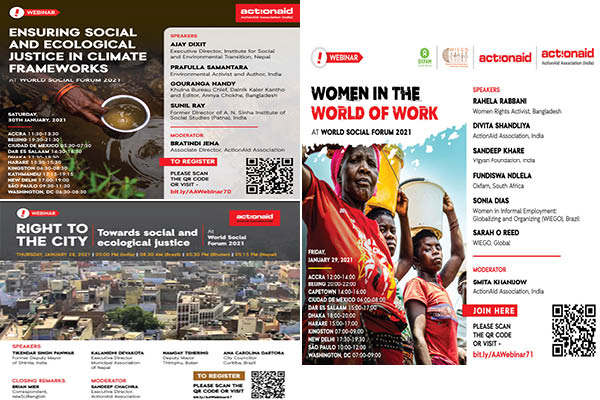The World Social Forum (WSF) is an important space for civil society from across the world to engage with each other to deepen democratic debates and seek progressive alternatives to the most pressing issues of our times. As part of the Virtual WSF 2021 held from January 23 to January 31, ActionAid Association organized multiple webinars on wide-ranging issues.
On January 28, we organized a panel discussion on ‘Right to the City: Towards Social and Ecological Justice’ with Mayors and city officials from Brazil, India, Bhutan and Nepal. The objective of the discussion was to explore the challenges and strategies in ensuring workers’ rights, reducing urban inequalities, and building inclusive cities in the context of the COVID-19 pandemic and in the framework of the Right to the City. The panel saw extremely rich deliberations on strengthening governance, and on making cities and their residents resilient.
On January 29, along with ActionAid Brazil, Oxfam South Africa and Women in Informal Employment: Globalization and Orgnaising (WIEGO), we organized a discussion on ‘Women in the World of Work’. Panellists from Brazil, South Africa, India and Bangladesh reflected on the many ways in which the pandemic has impacted women in the informal sector, from availability of work, safety concerns and access to public services, to increased care responsibilities. They also discussed government policies and civil society responses for relief and support to informal workers, and the ways in which community members are organizing and demanding action from policymakers.
On January 30, we organized a webinar on ‘Ensuring Social and Ecological Justice in Climate Frameworks’. During this session, panellists from Nepal, Bangladesh and India talked about the various forms of community alienation from commons and the differential impacts of climate change-induced disasters on the most vulnerable populations. They also discussed strategies for inclusive development processes.

